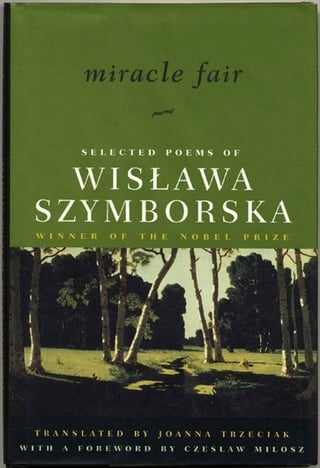If Wisława Szymborska (pronounced vees-WAH-vah shim-BOR-ska) were still alive today, she would celebrate her 94th birthday on July 2. Symborska passed away in February 2012, but she remains a remarkably prominent poet both in her native Poland as well as in various translations throughout the world. She won the Nobel Prize in Literature in 1996, and her work has been translated into dozens of languages. To celebrate her birthday this summer, we thought we’d tell you a little bit more about the poet and introduce you to some of our favorite works.
Szymborska’s Early Life and Work as a Polish Poet
 Szymborska was born on July 2, 1923, in Bnin, Poland (Bnin is now Kórnik), which is near the larger city of Poznań in Western Poland—about 270 kilometers due east of Berlin, Germany. She began writing during childhood and was first published in 1945 with the poem “Szukam słowa” [translation: “I am Looking for a Word”]. The poem was published in Dziennik Polski, or The Polish Daily. She moved to Krakow, where she lived throughout much of her adult life. While she consistently published her poetry, Szymborska also wrote for the literary journals Zycie Literackie and Pismo, and she translated French poetry.
Szymborska was born on July 2, 1923, in Bnin, Poland (Bnin is now Kórnik), which is near the larger city of Poznań in Western Poland—about 270 kilometers due east of Berlin, Germany. She began writing during childhood and was first published in 1945 with the poem “Szukam słowa” [translation: “I am Looking for a Word”]. The poem was published in Dziennik Polski, or The Polish Daily. She moved to Krakow, where she lived throughout much of her adult life. While she consistently published her poetry, Szymborska also wrote for the literary journals Zycie Literackie and Pismo, and she translated French poetry.
While working for the weekly publication Zycie Literackie, Szymborska published her own essays in the journal, as well. In total, Szymborska published 16 poetry collections in her lifetime. Our favorite English-language translations include Sounds, Feelings, Thoughts (1981), People on a Bridge: Poems (1986), View with a Grain of Sand: Selected Poems (1995), and Monologue of a Dog (2005).
Winning the Nobel Prize in Literature
 The poet rose to prominence among Polish readers relatively early in her career, but it was not until she won the Nobel Prize in 1996—one of comparatively few women to receive the prestigious award—that she became well-known to an international readership. According to the Nobel committee, her poetry “addressed existential questions” and is “unique among its kind and does not easily lend itself to categorization.” The Nobel committee praised her work, explaining:
The poet rose to prominence among Polish readers relatively early in her career, but it was not until she won the Nobel Prize in 1996—one of comparatively few women to receive the prestigious award—that she became well-known to an international readership. According to the Nobel committee, her poetry “addressed existential questions” and is “unique among its kind and does not easily lend itself to categorization.” The Nobel committee praised her work, explaining:
“Wisława Szymborska strives to illuminate the deepest problems of human existence, surrounded by the transitoriness of the now and everyday life. She weaves in the machinery of eternity in a momentary experience of the here and now. Her poetry is characterized by a simplified, ‘personal’ language that is unlike contemporary language, often with a little twist at the end, with a striking combination of spirituality, ingenuity, and empathy.”
In her Nobel lecture, Szymborska discussed the imaginative capacities of poetry, and the importance of recognizing one’s own limitations while striving to learn more:
“. . . I value that little phrase ‘I don’t know’ so highly. It’s small, but it flies on mighty wings. It expands out lives to include the spaces within us as well as those outer expanses in which our tiny Earth hangs suspended. If Isaac Newton had never said to himself ‘I don’t know,’ the apples in his little orchard might have dropped to the ground like hailstones and at best he would have stopped to pick them up and gobble them with gusto. Had my compatriot Marie Skłowdowska-Curie never said to herself ‘I don’t know,’ she probably would have wound up teaching chemistry at some private high school for young ladies from good families, and would have ended her days performing this otherwise perfectly respectable job. But she kept on saying ‘I don’t know,’ and these words led her, not just once but twice, to Stockholm, where restless, questing spirits are occasionally rewarded with the Novel Prize.”
Happy Birthday, Wisława Szymborska!
Won’t you join us in wishing a happy birthday to Szymborska? To honor her work, we’ll leave you with some words from “I’m Working on the World,” a poem that appeared in one of Szymborska’s first poetry collections, Calling Out to Yeti (1957):
I’m working on the world,
revised, improved edition,
featuring fun for fools,
blues for brooders,
combs for bald pates,
tricks for old dogs.









